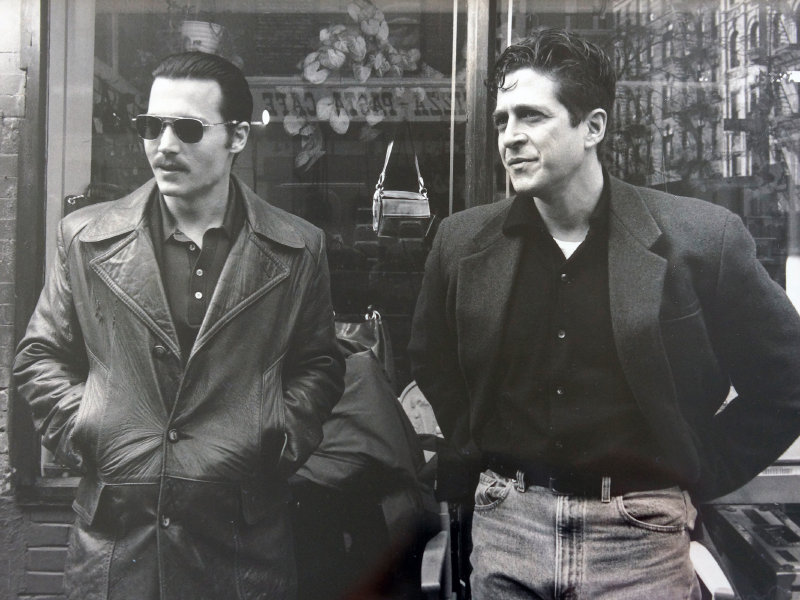Paul Attanasio has the kind of career in the entertainment industry that others dream about. In the ’90s, the critic-turned-screenwriter was nominated for two Academy Awards – one for "Quiz Show," another for "Donnie Brasco" – along with a stack of numerous other awards.
Less than a decade later, Attanasio put on his executive producer hat and helped bring "House," one of the most successful network TV shows in the past 10 years, to the small screen.
Now, he’s doing rewrites to a big-screen reboot of "Scarface" (only two beloved movies to live up to; no pressure) and writing the high-profile new Showtime series "The Vatican" (once again, no pressure). But before his latest projects take the stage, however, it’ll be his turn as the Milwaukee Film Festival celebrates his stellar career Saturday night with "An Evening with Paul Attanasio" at 7:30 p.m. at the Oriental Theatre.
Before Attanasio gets peppered with questions then, OnMilwaukee got a chance to ask him some of our own about his career, the state of film and TV and the state of a certain local baseball team that he might have some family ties to.
OnMilwaukee.com: When did you start getting interested in film and film writing?
Paul Attanasio: You know, when I was real young, I watched a lot of TV, which probably isn’t what the parents want to hear. I guess I got really interested in earnest when I became the film critic for the Washington Post at the age of 24.
I was thrown into the deep end of the pool and really had to learn about film and how to use that platform to learn about film. As the film critic, I also did a lot of feature articles, and I would call people up, interview them, whether they were in front of the camera, behind the camera or inside the business. So I used that in a way to learn about the industry from the inside out.
OMC: Was it kind of hard being so young and learning about film while also being an authority on film as a critic?
PA: What happened was they had fired their film critic – Gary Arnold, a good film critic – and then they couldn’t replace him. Everybody they tried to get to replace him wouldn’t move to Washington. All the film critics in New York, Los Angeles and Chicago were happy where they were. So they decided to make their own film critic. I was very inexperienced, and it was a little nerve-wracking, but I also had great energy and work ethic, and the fearlessness of youth. I just plunged into it. I think I was a pretty good film critic. I don’t think I was a great film critic.
OMC: How do you feel about the current state of film criticism?
PA: I think film critics really perform a valuable function. I think they are not outside the process; they’re a part of the process. I think they’re the conscience of the business, and they’re the only ones really who are invested the process who tell the truth. They have historical or academic perspective. A good film critic is really a valuable part of the process. It doesn’t feel good to get a bad review, but if you’re honest with yourself, you got to take the information and see what you agree with and don’t agree with. You’re not trying to please everybody.
OMC: Why and how, then, did you make that evolution from film critic to film writer?
PA: I quit the Post, and I went and wrote a script. It was bad, but good enough to get a job with Jerry Bruckheimer and the late Don Simpson. I had a job, and I had kind of a compelling story because very few film critics are able to make the transition. So I signed with CAA and moved out here. I’ve been living out here for 25 years now.
It was like going over the wall or the spy who came in from the cold, from being a critic to being on the other side. I think all the critics at the time were rooting for me because it was validation. There’s a mentality in Hollywood that critics don’t know anything. Well, they do know something, and I’m not the only one who’s done it. I remember it being kind of fun at the time, proving a point.
OMC: What is your favorite project that you’ve made or been apart of?
PA: "Quiz Show," which was my first movie and kind of like first love. It’s still a beautiful movie. It was really beautifully executed, and we got one of best directors around, Robert Redford. We got a great young cast, and my dad was in it. It was kind of a magic experience, and I don’t think anything will quite ever be like that.
OMC: Now I have to ask the flipside of that: What’s your least favorite project, or most difficult?
PA: They’re all difficult. I think there’s an illusion that it’s an easy job. What you do have is a great deal of freedom. So I can’t really single one out. Even the good ones are difficult.
OMC: Right now, you’re working on a remake of "Scarface." What is it like taking on such a high-profile character that people love so much?
PA: I think it just sets the bar higher. The original 1932 film was one of the best movies Hollywood ever made and was written by one of my heroes, Howard Hawks. Then the 1983 movie has become iconic in the culture. All of the imagery is continually referenced in the hip-hop world, and Al Pacino, who I worked with on "Donnie Brasco," gave one of his indelible performances.
So it just sets the bar higher where you feel like you really have to bring your A-game to execute. On the other side, I think if you do, it’s a great opportunity because it’s not "The Fast and the Furious." It aspires to more than that. It’s really an epic about the American experience. I’m excited about it.
OMC: You’ve worked on both the TV and movie side of the business, and it’s a very interesting situation nowadays, with many saying TV is becoming the new movies. How do you feel about that statement?
PA: I have a kind of different spin on that. I think that TV – and I’ll be really clear to say cable TV and pay TV – has been novel. The so-called binge viewers are watching six hours and eight hours at a time using Netflix or similar services, and it allows you to tell stories like novels. You can take Walter White over that entire journey that way you would do in a novel, with all the detours, characters, and nooks and crannies that you see in these cable shows, which you can’t do in a two-hour movie.
I think what you’re seeing is not the diminishment of the movies. I think there will always be a place for movies, and I love movies. I grew up with them, and I’m still primarily a film writer. Even in the movies, though, "Scarface" is conceived as this franchise that will expand over three movies, so even there, you’re seeing – and already have seen – this kind of novelistic storytelling, which has been rare. "The Godfather" is one of the great examples, where you have this kind of sprawling concern and taking a character over a long journey. I think that’s the moment we’re about to see, and that’s very exciting.
OMC: You isolated network TV out of that.
PA: I’m going to overstate it, but I think network TV is dead from the macro level and the micro level. I don’t think they’re going to fold up next year, but every possible reason for network TV to be keeps going away.
On the ground level, what I observe here is a brain drain. The creative people have too many opportunities on the other side, and they don’t want to go through the misery of the network process, which has become more panicked, more micromanaged and more volatile. I’ve been around for a while, and it’s certainly very different from the process we had for "Homicide" 20 years ago.
OMC: I’ve got one last question for you, not entertainment industry related. Grade your brother’s team’s performance this past year.
PA: Well, he’s said that it was a disappointing year. I think he promised to turn Milwaukee into playoff contenders when he took over ownership, and I think that’s his expectation every year. I think it was a disappointing year. Ryan’s suspension was certainly disappointing on many levels. Ramirez’s injury was hard. It was a hell of a division this year.
That said, I think you’ve got incredible young talent on that team, with Gomez, Segura, Khris Davis. The other bright spot was the pitching was actually quite excellent in the second half. They need to fill a couple of holes, but next year is next year. All those great Cardinal veterans will be a year older and hopefully a year creakier. If they could come out of the box with the same swagger they came out of the All-Star break, I think it could be a very exciting year next year.
As much as it is a gigantic cliché to say that one has always had a passion for film, Matt Mueller has always had a passion for film. Whether it was bringing in the latest movie reviews for his first grade show-and-tell or writing film reviews for the St. Norbert College Times as a high school student, Matt is way too obsessed with movies for his own good.
When he's not writing about the latest blockbuster or talking much too glowingly about "Piranha 3D," Matt can probably be found watching literally any sport (minus cricket) or working at - get this - a local movie theater. Or watching a movie. Yeah, he's probably watching a movie.







